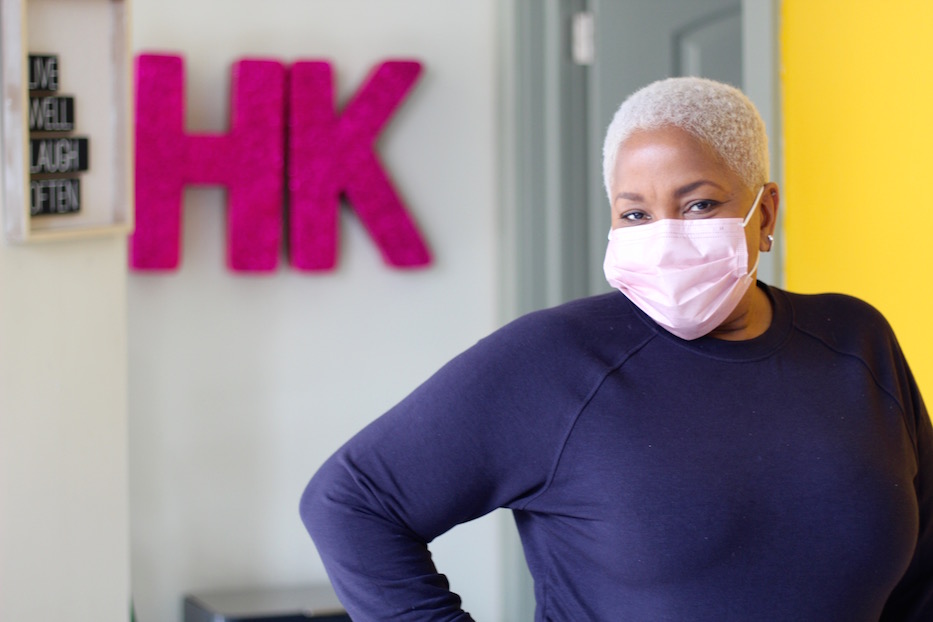
Black-owned businesses | Culture & Community | Dixwell | Economic Development | Arts & Culture | COVID-19
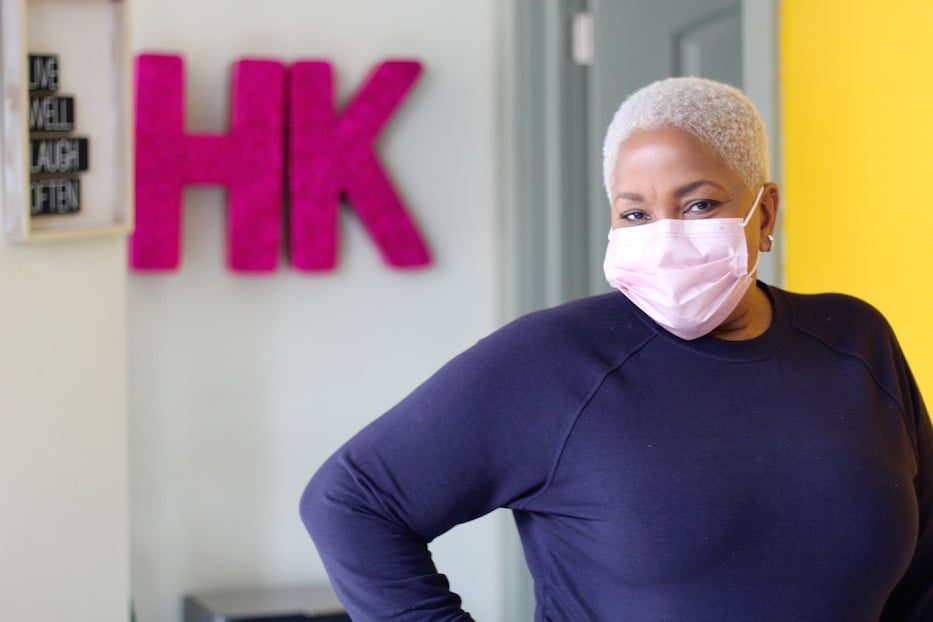
Karaine Smith-Holness on surviving 12 months into the pandemic: "The customers understood. We were basically all in the same boat. So we learned how to row together." Lucy Gellman Photos.
On Ashmun Street, Karaine Smith-Holness has been cultivating a sanctuary for years. Ceramic sinks glint in the sunlight. On one wall, a chalkboard announces cut and color, silk press, twist outs and hydration in bright, floral greens and yellows. Beside the window, a red hibiscus has exploded into bloom. Just above the front door, a framed sign reminds customers to live well, laugh often even in the midst of a long year.
Smith-Holness is the owner of Hair's Kay Beauty Salon, an Ashmun Street oasis that has lived in its current home for almost five years, and in New Haven for almost 30. A full year into the pandemic, she is focused on the future of her business—and the wellbeing of the Black women who build her community of care. She is not just a hairdresser: she is an alchemist, therapist, best friend, and witty confidant. When she laughs, her voice becomes music.
"Everybody, we're so heavy," she said in a recent interview at the salon. "The year has been heavy. Last year at this time, we were closed, and not knowing what to do. The customers understood. We were basically all in the same boat. So we learned how to row together."
Smith-Holness has built her business over 27 years, first with a spot at Fitch and Blake Streets, and now in the city’s Dixwell neighborhood. She was inspired to start a salon while working as a receptionist at one in her native Jamaica, where “I used to love how the women looked lighter and so confident when they left.” She started Hair’s Kay after moving to New Haven and realizing that she wanted to work for herself.
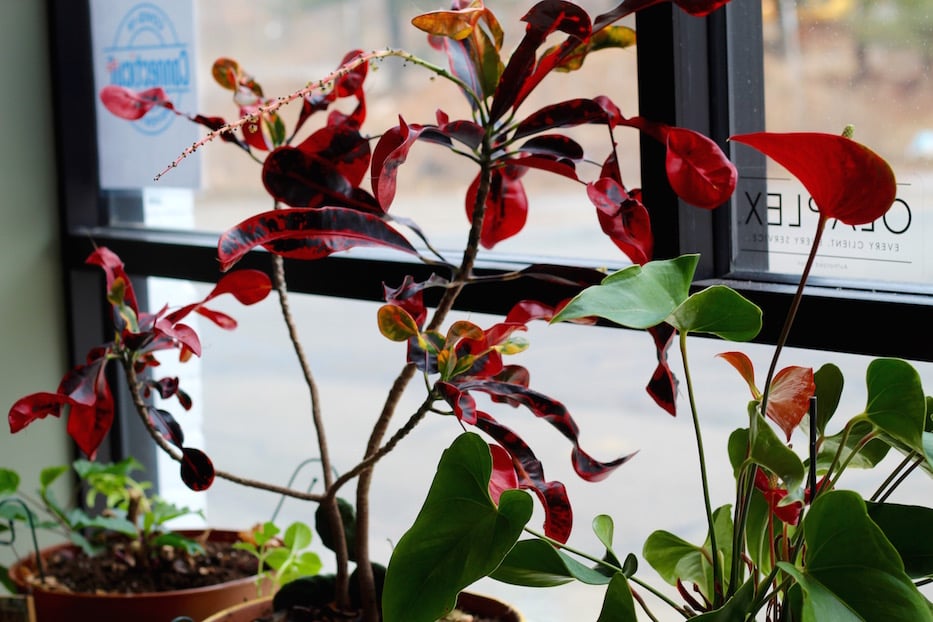
Since, it has become much more than a salon: it is an affinity space and bloom-studded jewel box that holds sweet-scented secrets, laugh lines, and stories women file away in their chests until the right moment comes to let them loose. She estimated that she has a faithful customer base of around 100 women, including customers who drive from New York and Washington, D.C. once a month to see her. Because New Haven is a rotating door, new clients also find their way to her frequently.
Her livelihood was thrown into question when the pandemic hit. On March 11 of last year, Smith-Holness shut down her salon in an early effort to stem the spread of the novel coronavirus. She was one of the first businesses in the state to close, in what became a long list of schools, bars, restaurants, gyms, and performing arts venues. When she traces the chronology of the past year, she is quick to point out that small businesses have long run on razor-thin margins—Covid-19 pushed many of them to a breaking point.
"We are all living a nightmare while we're still living," she said. "Weddings have to be cancelled. Funerals. And it's like, you just lose so much. And then the bills never stop coming. It's a lot. It's still a lot. You just find a reason or a way to smile."
Early on in the pandemic, Smith-Holness combed through the alphabet soup of federal relief funding with little success. Like many of the city's small business owners—and Black small business owners across the country—she was shut out of Paycheck Protection Program (PPP) funding despite the fact that her books were in order and she had run a business for almost three decades. She was able to secure a loan through HEDCO (the Hartford Economic Development Corporation), which allowed her to buy extra equipment that she needed for reopening.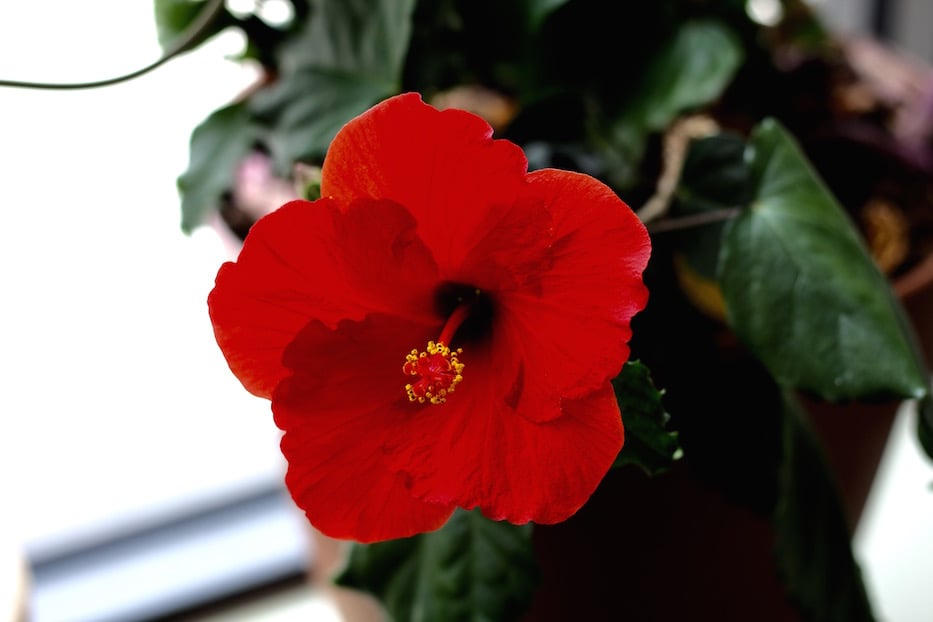
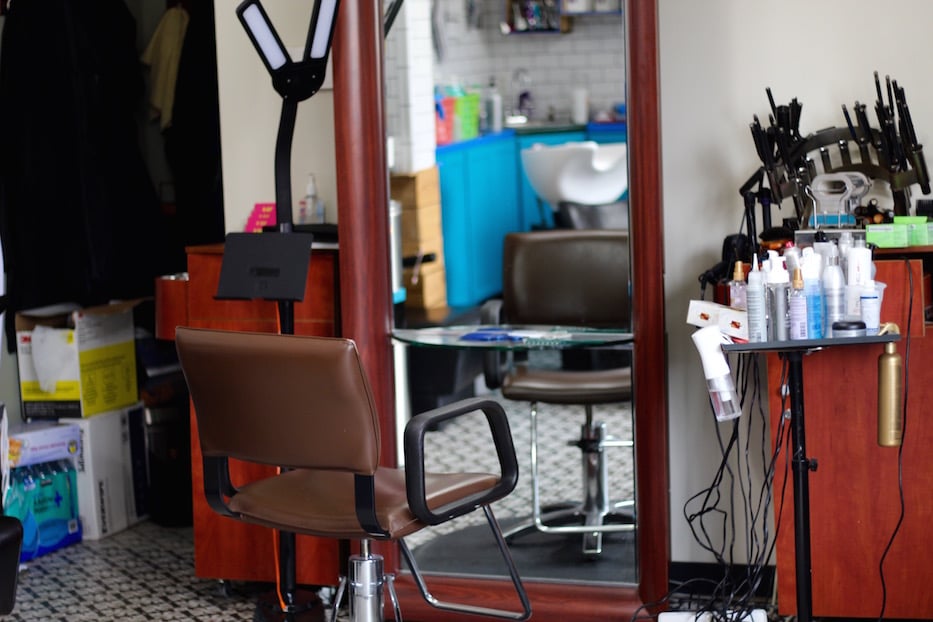
She spent the time updating her salon, which is a tidy 550 square feet with brown-and-white tile floors and swivel chairs with leather seats and shiny black handles. Before the pandemic, she owned one air filter; she bought another before they disappeared. She set up sanitizing stations. A client gifted her a stainless steel wipe dispenser ("she said I'm extra," she laughed). Unable to go home to Jamaica, she painted her cabinets a brilliant turquoise that shines when the sunlight comes through her street-facing windows. She added yellow and pink accents, for a look that she described as “bringing the sea and sun” to her corner of the world.
"This saved me," she said. "I was able to come here daily, and I would be here for hours. You clean up. You sort through. Things that you never get an opportunity to do, because you were busy working."
She tended to her plants, a small, bright garden of hibiscus, peace lilies and flowering crotons that she keeps on a windowsill facing Ashmun Street. She also tended to her client base, with bi-weekly Zoom check-ins that went over both hair care and self care. Many of them checked in on her too. Several sent her payments for hair appointments that would have taken place, with a little note of encouragement. In a year of loss—both she and her clients have lost multiple friends in the past 12 months—she said they held her up.
"I think people made really and truly ... they made choices,” she said. “Even when they could have cooked, they knew they had to order at least two meals from a restaurant. The community rallied behind small businesses. The big businesses like WalMart, and Target, and Amazon, they made a killing. But the small mom and pop businesses, they depended on their community for support. So I'm thankful for my community. "
"Everybody was losing people, left, right, and center,” she later added. “The only thing to do was to remain strong and know when you are at the breaking point. I have been blessed with some amazing girlfriends, so you can call somebody and say, 'I'm there.' And they will allow you to talk and cry and release.”
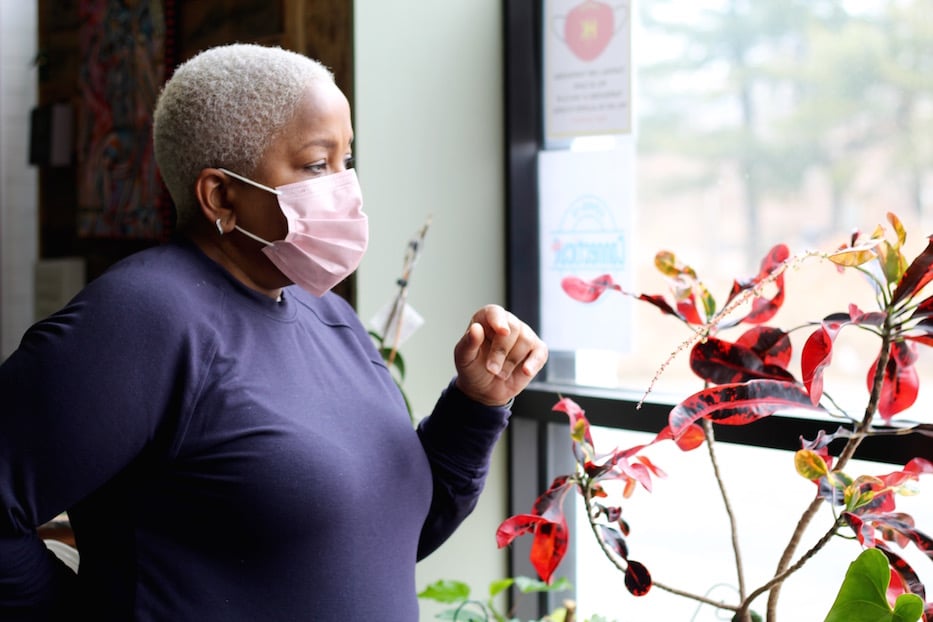
"The only thing to do was to remain strong and know when you are at the breaking point. I have been blessed with some amazing girlfriends, so you can call somebody and say, 'I'm there.' And they will allow you to talk and cry and release.”
Meanwhile, she became a voice of authority in the state’s business ecosystem: she joined New Haven and Hamden State Rep. Robyn Porter in talking to fellow small business owners about how to reopen safely. Because Smith-Holness works alone, she was able to start bringing customers back into the salon as soon as Lamont gave her the green light. On her days off, she also picked up part-time work at JoAnn Fabrics in Hamden.
Months later, it has changed the way she does business. Prior to the pandemic, she was able to double book, meaning she could see up to 40 people per week. Now, due to capacity limits, that number is scaled down “dramatically,” she said. While the state allows up to 75 percent capacity, she typically has one person in the salon at a time, unless her clients are podded up, such as two sisters or a mother and daughter. She estimated that she sees four to five clients per day, Wednesday through Saturday.
Instead of buying hair-care products for an entire month, she now buys them on a weekly scale. A neat, silver-tinted pyramid of products sits shelved by the front door: she said clients are grateful for it, particularly since lockdown left women stranded without the right treatments last year.
She's also asked her customers to try to know what they need beforehand, because it lets her figure out how many people she can reasonably book in a week. A relaxer with a retouch and blow dry might be a two or two and a half hour service. If someone wants thermal silkening, that may be another two to three hours depending on the length and texture of their hair. A wash alone may be as brief as 45 minutes, but any treatment immediately adds time to that.
"It's a lot of work," she said. "It's just a little bit more cleaning, a little bit more wiping, a little bit more laundering.”
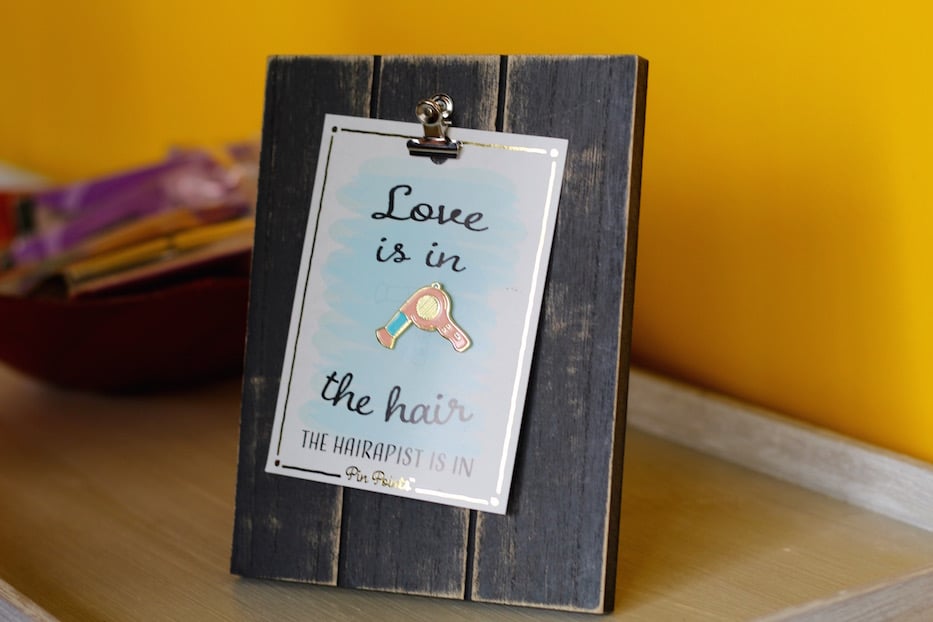
A pin that one of Smith-Holness' longtime clients gifted her.
And yet, she said, she tries to find silver linings in a year upended by the pandemic. Covid-19 forced her to slow down for the first time in decades and "really reevaluate what is important," including boundary-setting and taking care of herself as she takes care of those around her. Even as pandemic restrictions are lifted, she plans to keep the cap on the number of clients she sees in a given week, because of the wear and tear of the profession on her body. She holds onto a phrase she and friends repeated on a trip to Jamaica in 2017: “guard your peace by any means necessary."
She also sees a tide turning on a statewide and national scale, she said, describing 2021 as "a Black woman's year." In November and again in January, she celebrated as Stacey Abrams flipped Georgia blue for the first time sine 1992. This month, she watched Connecticut's passage of the CROWN Act after a years-long fight from State Rep. Robyn Porter. Both are close to her heart: for years, she's watched customers come in with natural hair and ask for a relaxer because they don't want their hair to become a topic of discussion or debate in a job interview or new workplace.
"Look at what she did with her coils and her kinks," she said of Abrams. "Some people are still going to see her as a Black woman. But most people are going to see her as the phenomenal woman who she is. And that's what people have always wanted. See me for who I am.”
Now that her doors are again open for business, she has a steady stream of both longtime and new customers to fill her days. In February, 25-year-old Yvette Afriyie-Agyemang decided to try Hair’s Kay for the first time after months of experimenting at home with her natural hair. Born and raised in London, Afriyie-Agyemang said she has always struggled with her hair. As a kid, she used chemical relaxers until she was 11. Then “box braids were basically my whole life,” she said.
By February, “I was looking for some sort of self-care that didn't entail me looking at my walls,” she laughed in a phone call Friday morning. After months of trying out different products, she decided to go for the big chop. She remembered feeling jittery and excited the night before her appointment.
“And so I went there, and it was just amazing,” she said. “Not only did she give me an amazing haircut, but she's also very warm, very welcoming. She asked me what kind of cut I wanted. I just gave her my hair history, and it enabled me not only to have a fresh start, but also to look fierce and cute and confident. ”
What set Smith-Holness apart, she continued, was her constant focus on everything Afriyie-Agyemang had done to care for her hair during lockdown and isolation. After chopping it off, Smith-Holness gave her a new hair care regimen. She said she is happier with her hair now than she has ever been in her life. It is the first time her classmates have been able to see her with her natural hair.
“I never imagined that I could have healthy hair, and you showed me that that’s a lie,” she said in a video to Smith-Holness. “Honestly, when you told me that my hair was healthy and there was nothing wrong with it, I didn’t believe you. I honestly didn’t. And one month later, I absolutely do … I have the confidence to rock my natural hair now without having to hide behind anything.”
For Smith-Holness, that is the kind of relationship she hopes to grow with every client. Kids who started at her salon as babies are now in middle and high school. She has celebrated job interviews and promotions, new babies, homegrown businesses, and now newly vaccinated clients (she is set to become eligible for vaccination on Monday). When a 13-year-old client announced she was selling scarves, Smith-Holness was one of the first to support her. That circle of care has got to continue, she said.
"There's no way we can repeat this,” she said of the pandemic. “In everything that we do. In how we look at our businesses, in how we care for our customers, the way we care for our neighbors and our friends, we have to check in with each other.”

